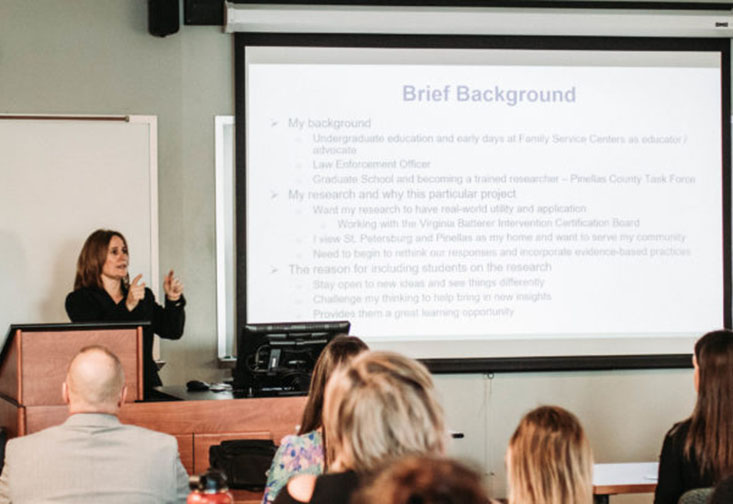Every 60 seconds, two dozen people in America become victims of domestic violence. More than one in three women and one in four men will experience some type of domestic violence in their lifetime. Pinellas County residents are particularly at risk. Out of Florida’s 67 counties, Pinellas ranks fifth in the rate of domestic violence.
Shelly Wagers, an Assistant Professor of Criminology at USF St. Petersburg, wonders how we, as a community, can reduce rates of domestic violence, hold offenders accountable and keep victims safe?
This past fall semester, Wagers, who has worked in the field of domestic violence since 1994, took a closer look at local domestic violence. She spearheaded a series of research projects called Rethinking Domestic Violence Cases, which examined legal cases involving domestic violence incidents. In one project, students in Wagers’s Introduction to Courts Course conducted research by observing advisory hearings to collect data on what was happening in those hearings. In the other project, three students under Wagers’s direction collected public data to evaluate the filing rates in domestic violence cases in Pinellas County.
At the end of the semester, Wagers and her students presented their findings to the leadership of Community Action Stops Abuse (CASA), a local domestic violence shelter and advocacy group that works with victims of such violence in Pinellas County. Among the attendees at the presentation on Tuesday, December 10 were CASA CEO Lariana Forsythe, members of CASA’s board of directors and individuals from an advisory council.
“These projects provided students the opportunity to not only participate in conducting research but to see how research has real-world implications. Additionally, having the presentation gives students the opportunity to interact with professionals who are in leadership roles in our community.” Wagers said.
Heather Sherman, a senior forensic studies and justice major, was one of the students who conducted research. Using publicly available data, Sherman and her peers considered how 84 different variables—including demographic information and history of abuse—correlated with the state attorney’s filing rate of domestic violence cases.
“We tried to figure out what variables affect these filing decisions,” she said. “One thing we found was that if the victim chooses not to prosecute, the case is less likely to be filed. This tells us that the victim’s voice has an impact”
CASA CEO Lariana Forsythe echoed that finding. “Prosecution of these cases is very difficult when there’s not a ‘cooperative’ victim,” she said. “From our perspective, it’s about what we can do to make sure victims feel supported and knowledgeable about their case.”
Forsythe was impressed by how well Wagers’s students were able to navigate the complicated topic of domestic violence court cases.
“Domestic violence cases are very complex and often times victims fear facing their abusers in court and are overwhelmed by the criminal justice system. These students really understood the complexity of these kinds of cases” she said. “At CASA, we prioritize victim safety and have dedicated advocates ready to help victims navigate criminal cases.”
USFSP and CASA have previously teamed up on domestic violence research. Earlier this year, researchers from the Kate Tiedemann College of Business published a study in partnership with CASA that helped quantify the economic impact of rape, physical assault, stalking and other acts of domestic violence on individuals, families and the community. The study found that the cost of domestic violence in Pinellas County is $132 million a year, or roughly $21,000 per victim.
“The costs aren’t just to the victims of domestic violence and their children, but they are also borne by society,” said Economics Instructor Rebecca Harris, who was a researcher on the study. “We end up paying for law enforcement who are protecting victims and for court costs of judges and bailiffs involved in these cases. Also, the employer pays the cost of finding new employees or filling shifts and rearranging schedules for those who miss work.”
For Sherman, the forensic studies and justice major, the directed research taught her just how labyrinthian the court system can be and motivated her to help victims.
“The most important thing I’ve learned from this project is that the legal system is incredibly hard to navigate,” she said. “It’s intimidating and with something as delicate as domestic violence, victims need assistance.”
To that end, Sherman said this experience is making her consider law school or victims advocacy work to assist those in need.
Similar research projects will continue in the future with Wagers at the helm. She plans to work with students and CASA, studying and implementing evidence-based practices to support domestic violence victims in the court system.
“This was just the first step in a long-term partnership,” she said.
